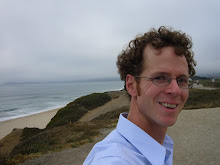There's a certain kind of person—and I include myself—who gets a little antsy this time of year. We've made our holiday trips, used our vacation days, and rationalized a whole season of indulgences. The next paid holiday isn't for five months. In short, we've run out of distractions and there's nothing for it but to confront life, with its waking up, going to work, and the whole bit. The obvious response, for those of us of a certain temperament, is to invent a new distraction as quickly as possible. The louder and more dramatic the better, so it's hard to beat an immediate campaign of urgent self-improvement.
Any over-ambitious plan can occupy my thinking for a couple days, but I've found I get the most distraction value from the most realistic goals. Unrealistic goals get uninteresting as soon as they fail, which they seem to do pretty quickly. Realistic goals, in addition to lasting longer, can offer the benefit of changing something worth changing. So in the spirit of this bicycle- and pedestrian-oriented column, I offer some realistic thoughts about changing travel habits from two people in our fair valley who are leading by example.
Becky Brown is a mother of three who recently founded Ashland CarShare, a non-profit business that lets members share the costs and the benefits of car ownership. This is not a disinterested pursuit for Brown, who has been living car-free since she sold her ailing VW van in 2007. Brown eased her family into the change after she realized repairing—and keeping—the van was optional. Brown says her attachment to owning a vehicle "was like a mental block." Once she got past it, she realized the van had "fostered a dependence that made me uncomfortable." Her children, however, didn't immediately embrace the idea. "For a while, the kids begged to take the van every time we went out." But Brown was persistent, parking the van out of sight while she made sure her family could in fact live without a vehicle. After three months of walking, cycling, and busing around town, she and her children saw that the van had become peripheral to their lives. Brown hasn't looked back, and the carsharing program is an effort to make the new lifestyle sustainable for her family and accessible to others.
Jim Bauermeister suspects he's still the only person ever to have biked to his high school in rural eastern Washington. He rode the 22-mile round trip a couple times and never fully recovered from the experience. Bauermeister, of Medford, is now orchard manager for the OSU Extension Service in Central Point. He aims to bike his commute more often than he drives it. Bauermeister traces his interest in bike commuting to the first energy crisis in the 70's, and he has found in his love of resource efficiency a lasting reason to ride instead of driving. "I like bikes," he explains. "They're superior to cars in every way... though they're not much for carrying plywood."
My own travel change is not complete, but I've made some progress. Most days, I ride my bike to work. When my will falters, I take the bus or share a ride to the transfer station. Cycling to work makes me happy, and it lets my wife and me get by with one car. I trace my bike commuting days to Bike to Work Day in 2002. From that great ride forward, I thought of myself as a bike commuter, though my dusty 10-speed might often have disagreed. It wasn't until my wife and I got rid of our second car that the change really took hold. The two key moments in my progress were 1) taking that first ride, and 2) eliminating driving completely from my daily choices for getting to work.
My change of habit has actually been fairly easy, but it became possible only when I did away with the even easier option of driving. We're like water, aren't we? We can cut our way through a mountain range if we must, but only when there's not an easier way. In contrast to water, though, we're able to chose our own route—and reap the rewards of that choice. As Becky Brown says of raising a family without a car, "It's not hard at all. The hard part is living in a car world."
Incidentally, I plan to try jogging my commute as soon as I shake this cough. That and a little more good snow in the mountains ought to keep me distracted at least through March.
Subscribe to:
Post Comments (Atom)

1 comment:
The CarShare idea sounds great for families that otherwise walk or bike most places.
My family, although we own an old vehicle, walks or rides the bus nearly everywhere. Sometimes, though, we have to get somewhere distant at a time that the bus services aren't available.
Also, we do one (sometimes two) major grocery shopping trips a month that requires us to travel to Medford. Needless to say, a bike or bus trip just doesn't work for such a trip.
These are our main reasons for retaining ownership of our vehicle, but big ones for us. Most of the time, it sits in the driveway.
Post a Comment